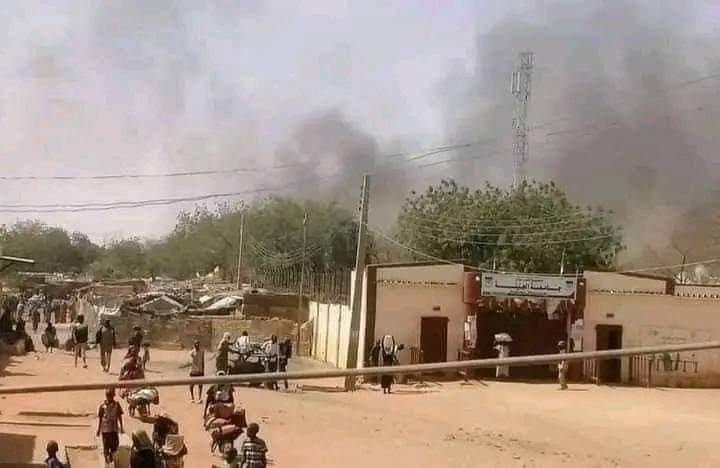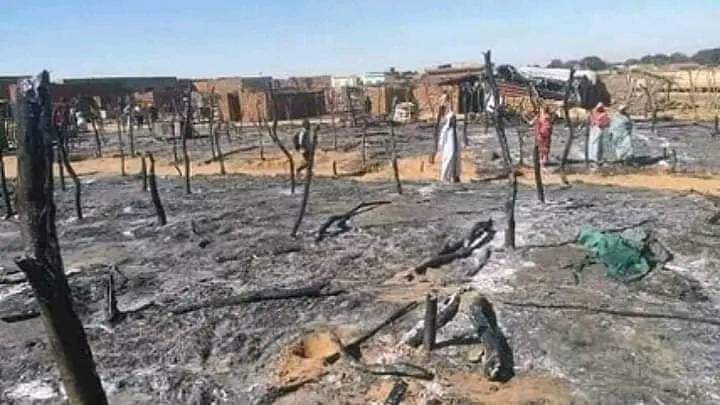
Citizens of West Darfur: The Fire of Survival and the Ashes of Refuge
News Report - Moatinoon
Like seeking refuge from fire in the scorching sun, this proverb has been circulating among Arabs since ancient times and has become a saying used to describe someone who chooses an alternative that they believe is easier than the original situation.
The citizens of West Darfur and especially the residents of El-Geneina have defied the essence of this proverb by fleeing their homes and dwellings, escaping the fires of their own people in their homeland and crossing the border into Chad, the closest country to them, in search of safety and security. They hoped to find shelter, food, and medicine after being trapped in their own country, but they may have found ashes instead.
It was inevitable for the flames of war, which ignited in Khartoum between the Sudanese Armed Forces and the Rapid Support Forces, to reach the far corners of Darfur. It was in Darfur that the seed of the Rapid Support Forces, established by the Islamist regime under the leadership of Omar al-Bashir and overseen by the Sudanese army, was first planted to combat the armed movements opposing the regime at that time.
After one week of fighting in the heart of Khartoum and its spread to the cities of Khartoum, Omdurman, and Khartoum Bahri, since April 23rd, the militias supported by the Rapid Support Forces besieged several towns in Darfur. El-Geneina, the capital of West Darfur, was the most affected by the conflict, which transformed from a battle between two military forces, the army and the Rapid Support Forces, into an ethnic conflict fueled by simmering tensions beneath the surface of formal tribal reconciliations.
El-Geneina under Hellish Conditions
The citizens of El-Geneina faced a catastrophic situation due to the ongoing fighting in the city. They endured difficult days with a complete lack of health and humanitarian services and communication blackouts.
Preliminary statistics recorded 1,100 civilian deaths, while the number of injured and wounded reached approximately 3,000 individuals. Half of the citys neighborhoods suffered near-total destruction.
This dire situation forced citizens to flee for their lives outside the city. The nearest and safest area was crossing the border into neighboring Chad. In a poignant scene captured in a video shared on social media, women and children were seen leaving en masse, with nothing left to hold onto after experiencing the horrors under the fighters fire.
The situation in El-Geneina raised internal and international concerns about the escalation of the conflict into an ethnic and tribal civil war. The United Nations-African Union Mission in Darfur (UNAMID) expressed its concerns about the events unfolding in Darfur in general.
The Armed Conflict Location & Event Data Project (ACLED) revealed in its May report an increase in violence in the city, with sectarian clashes occurring more than four times compared to the previous year.
The Sudan Conflict Tracker, launched by the United States, documented widespread violence and complete displacement of communities in Darfur states. A spokesperson for the U.S. Department of State stated that the atrocities taking place in West Darfur and other areas serve as a grim reminder of the horrific events that led the United States to declare genocide in Darfur in 2004.
Assassination of the Governor
The tragic events in El-Geneina reached their peak when a video circulated showing members of the Rapid Support Forces arresting and brutally assassinating the Governor of West Darfur, Hemeti Abdelkarim, afterwards. This incident brought Darfur back into the spotlight, as it was strongly condemned by various political and social forces within the country. The UN Special Envoy for Sudan, Volker Perthes, implicated the Rapid Support Forces in the incident and condemned it, as did the United States.
The UN High Commissioner for Human Rights also condemned the killing of the Governor of West Darfur in a statement released on June 16th, stating that El-Geneina had been subjected to widespread and repeated attacks by the Rapid Support Forces and their allies.
The situation in El-Geneina raised internal and international concerns about the escalation of the conflict into an ethnic and tribal civil war. The United Nations-African Union Mission in Darfur (UNAMID) expressed its concerns about the events unfolding in Darfur in general.
The Armed Conflict Location & Event Data Project (ACLED) revealed in its May report an increase in violence in the city, with sectarian clashes occurring more than four times compared to the previous year.
The Sudan Conflict Tracker, launched by the United States, documented widespread violence and complete displacement of communities in Darfur states. A spokesperson for the U.S. Department of State stated that the atrocities taking place in West Darfur and other areas serve as a grim reminder of the horrific events that led the United States to declare genocide in Darfur in 2004.
Assassination of the Governor
The tragic events in El-Geneina reached their peak when a video circulated showing members of the Rapid Support Forces arresting and brutally assassinating the Governor of West Darfur, Hemeti Abdelkarim, afterwards. This incident brought Darfur back into the spotlight, as it was strongly condemned by various political and social forces within the country. The UN Special Envoy for Sudan, Volker Perthes, implicated the Rapid Support Forces in the incident and condemned it, as did the United States.
The UN High Commissioner for Human Rights also condemned the killing of the Governor of West Darfur in a statement released on June 16th, stating that El-Geneina had been subjected to widespread and repeated attacks by the Rapid Support Forces and their allies.
Extreme and severe heat of refuge
Home has no equal, but... Perhaps this was the sentiment of many who were displaced north, east, west, and south, and those who crossed the borders to neighboring countries. However, the conditions of the refugees who fled West Darfur to Chad, as depicted by M�decins Sans Fronti�res (Doctors Without Borders), evoke pessimism, even though it may not compare to the hellfire of remaining in their homeland. The organization warned that thousands of people who gathered on the eastern border of Chad, seeking refuge from the escalating conflict in neighboring Sudan, are at risk of losing access to vital humanitarian and medical assistance as the rainy season approaches.
The organizations concerns revolved around the isolation of Sudanese refugees and host communities during the rainy season, which would mean the disruption of roads leading to their places of residence and subsequently result in grave humanitarian consequences.
The organization also expressed concerns about the increased risks of waterborne and infectious diseases due to the current conditions characterized by limited access to clean water and sanitation services.
Audrey Van der Schoot, the head of M�decins Sans Fronti�res mission in Chad, stated, Many refugees want to move away from the border area, but there is not enough space for them to relocate. At the same time, there are others who want to stay where they are, in addition to the continued arrival of people from Sudan.
She added, We fear that with the start of the anticipated rainy season, people in this border area will find themselves trapped, forgotten, and unable to access life-saving essential services or information about where to obtain them.
The international organization warned that people may find themselves faced with unimaginable choices, such as staying without any assistance or returning to Sudan where they would be exposed to further violence, physical harm, and psychological trauma. The ongoing humanitarian work must prioritize the situation of these people and their needs, as they could ultimately become stranded on the border.
Survivors describe their experiences in a state of shock, having been subjected to extreme levels of violence, including reports of sexual and gender-based violence, torture, abduction, forced recruitment, looting, and extortion, as well as the destruction of property.
Furthermore, those fleeing the conflict in Sudan have been held against their will and forced to pay money to enter Chad, otherwise their belongings would be looted, or they may face threats of death from armed groups.



